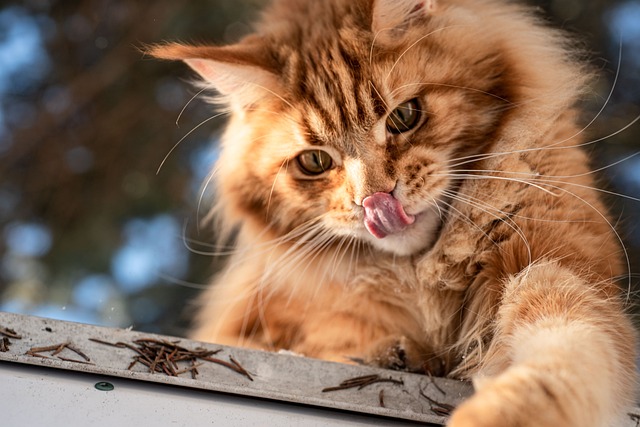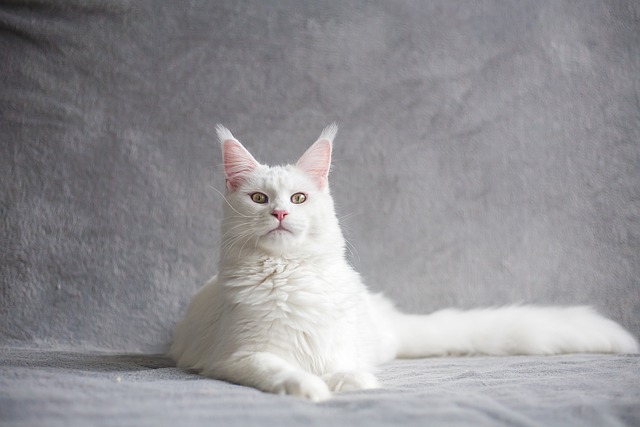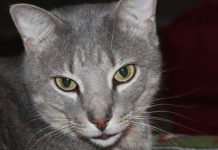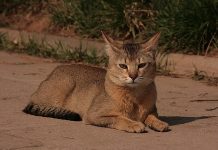History and Origins of the Maine Coon Breed

The Maine Coon is a fascinating breed with a rich history rooted in folklore and early American culture. While its exact origins remain a subject of debate and speculation, several theories and legends surround the breed’s development. Here’s an overview of the history and origins of the Maine Coon breed:
- American Folklore: One popular legend suggests that the Maine Coon is a result of domestic cats mating with raccoons, which is biologically impossible. This myth likely arose due to the breed’s large size, bushy tail, and tufted ears, reminiscent of a raccoon’s appearance.
- Seafaring Cats: Another theory suggests that Maine Coons were introduced to America by sailors or Vikings, who brought long-haired cats on their ships to control rodents. The cats then interbred with local cats, resulting in the development of the Maine Coon breed.
- Natural Selection: It is believed that Maine Coons evolved through natural selection in the harsh climate of Maine, where they adapted to survive harsh winters and rugged terrain. Their thick, water-resistant coats, tufted ears, and bushy tails are well-suited for the cold weather.
- Early American History: Maine Coons gained popularity in the 19th century as skilled mousers on farms and ships along the northeastern coast of the United States, particularly in Maine. They were prized for their hunting abilities, friendly demeanor, and unique appearance.
- Recognition and Breed Standard: The Maine Coon breed was officially recognized by cat registries in the late 19th century. The breed standard was established to preserve its distinctive characteristics, including a large, muscular body, tufted ears, bushy tail, and various coat colors and patterns.
- Decline and Revival: Maine Coons faced challenges during the mid-20th century due to the rise of other popular cat breeds. However, dedicated breeders and enthusiasts worked to revive the breed’s popularity and preserve its unique traits.
Today, the Maine Coon is one of the most beloved and iconic cat breeds in the world, admired for its friendly nature, intelligence, and striking appearance.
Physical Characteristics and Appearance of Maine Coon Cats
Maine Coons are known for their impressive size, robust build, and distinctive features that reflect their adaptation to the rugged landscapes of Maine. Here are the key physical characteristics and appearance traits of Maine Coon cats:
- Size: Maine Coons are one of the largest domestic cat breeds, with adult males typically weighing 13-18 pounds (6-8 kg) and females weighing 8-12 pounds (4-6 kg). Some Maine Coons can weigh even more, reaching up to 25 pounds (11 kg) or more.
- Body Type: Maine Coons have a muscular and rectangular body shape, with a solid bone structure and a balanced appearance. They are well-proportioned and agile cats.
- Head and Face: The head is slightly longer than it is wide, with a squared-off muzzle and high cheekbones. Maine Coons have a gentle and expressive face, with large, wide-set eyes that can be gold, green, copper, or amber in color.
- Ears: Maine Coons have large, tufted ears with lynx-like tips. The ear tufts help protect their ears from cold weather and harsh conditions.
- Tail: The tail is long, bushy, and tapering, often extending past the shoulders when the cat is relaxed. The tail is thick and well-furred, resembling a raccoon’s tail.
- Coat: Maine Coons have a dense, water-resistant double coat that varies in length and texture. The coat is longer on the ruff, chest, and tail, with a silky texture that lies flat against the body.
- Coat Colors and Patterns: Maine Coons come in a wide range of colors and patterns, including solid colors, tabby patterns, tortoiseshell, calico, and bi-color combinations. Common colors include brown tabby, silver tabby, red, cream, black, and white.
- Paws: Maine Coons have large, round paws with tufts of fur between the toes, providing insulation and protection from cold surfaces.
- Overall Appearance: Maine Coons have a majestic and regal appearance, with a friendly and laid-back demeanor that complements their impressive size. They are known for their intelligence, sociability, and affectionate nature.
Maine Coons are highly adaptable and make excellent companions for families, singles, and seniors alike. Their unique appearance, friendly personality, and playful nature have earned them a special place in the hearts of cat lovers worldwide.
Maine Coon Cat Temperament and Personality Traits
Maine Coon cats are beloved for their friendly, sociable, and gentle nature. Known as “gentle giants,” these cats have a charming personality that makes them wonderful companions. Understanding their temperament and personality traits can help you provide the best care and companionship for your Maine Coon cat. Here’s an overview of their characteristics:
- Friendly and Sociable: Maine Coons are outgoing and sociable cats that enjoy interacting with people and other pets. They are often referred to as “dog-like” due to their friendly demeanor and affectionate nature.
- Intelligent: Maine Coons are highly intelligent cats known for their problem-solving skills and curiosity. They enjoy interactive toys and puzzles that stimulate their mind.
- Adaptable: Maine Coons adapt well to various environments and lifestyles. They are equally happy lounging indoors or exploring outdoor enclosures under supervision.
- Playful: Despite their large size, Maine Coons retain a playful and kitten-like demeanor throughout their lives. They enjoy interactive play sessions and may even learn to play fetch.
- Gentle with Children: Maine Coons are patient and gentle with children, making them excellent family pets. They can tolerate handling and enjoy participating in family activities.
- Affectionate: Maine Coons form strong bonds with their owners and enjoy being part of the family. They may follow you around the house and seek attention and affection.
- Vocal: Maine Coons are known for their soft, chirping vocalizations rather than loud meows. They use their voice to communicate and express their needs.
- Independent: While they enjoy companionship, Maine Coons also appreciate their independence and can entertain themselves when needed.
- Easy-Going: Maine Coons have a relaxed and easy-going temperament, making them adaptable to different living situations and personalities.
- Loyal: Maine Coons are loyal to their families and may develop a special bond with one or more individuals. They thrive on attention and affection.
- Good with Other Pets: Maine Coons generally get along well with other pets, including dogs and other cats. They are sociable and enjoy the company of other animals.
Overall, Maine Coons are gentle, intelligent, and affectionate cats that thrive on companionship and interaction. They make wonderful family pets and are well-suited to households seeking a loving and sociable feline companion.
Care and Grooming Needs for Maine Coon Cats
Maine Coon cats have moderate grooming needs due to their dense, water-resistant coat. Regular grooming and proper care help keep them healthy and comfortable. Here are some important care and grooming tips for Maine Coon cats:
- Brushing: Maine Coons have a thick double coat that requires regular brushing to prevent matting and reduce shedding. Use a stainless steel comb or a slicker brush to gently remove loose hair and detangle knots. Aim to brush your Maine Coon at least a few times per week, increasing to daily during shedding seasons.
- Bathing: Maine Coons may benefit from occasional baths, especially if they get dirty or oily. Use a gentle cat-specific shampoo and lukewarm water. Avoid bathing too frequently to prevent stripping natural oils from the coat.
- Nail Trimming: Keep your Maine Coon’s nails trimmed to prevent them from becoming overgrown or sharp. Use cat-specific nail clippers and trim the tips of the nails every few weeks.
- Ear Cleaning: Check your Maine Coon’s ears regularly for dirt, wax buildup, or signs of infection. Use a cotton ball dampened with a vet-approved ear cleaner to gently clean the outer ear, avoiding the ear canal.
- Dental Care: Maine Coons are prone to dental issues, so dental hygiene is essential. Brush your cat’s teeth regularly with a cat-specific toothbrush and toothpaste to prevent tartar buildup and gum disease.
- Nutritious Diet: Feed your Maine Coon a balanced and appropriate diet formulated for their age, activity level, and health status. Provide fresh water at all times and monitor their food intake to prevent obesity.
- Regular Veterinary Care: Schedule regular veterinary check-ups for your Maine Coon to monitor their health, administer vaccinations, and address any medical concerns promptly.
- Environmental Enrichment: Maine Coons are intelligent and active cats that benefit from interactive toys, puzzle feeders, and climbing structures. Provide opportunities for mental and physical stimulation to keep them happy and engaged.
- Safety Measures: Maine Coons are curious cats, so ensure that your home is safe and free from potential hazards. Keep toxic plants, chemicals, and small objects out of reach.
By providing attentive care, regular grooming, and a stimulating environment, you can ensure that your Maine Coon cat remains healthy, happy, and well-loved. Their friendly disposition and affectionate nature make them cherished companions for cat lovers of all ages.
Health Considerations and Common Issues in Maine Coon Cats
Maine Coon cats are generally healthy and hardy, but like all breeds, they may be prone to certain health conditions. Understanding these potential issues and providing appropriate veterinary care can help ensure the well-being of your Maine Coon cat. Here are some common health considerations and issues in Maine Coon cats:
- Hypertrophic Cardiomyopathy (HCM): This is a genetic heart condition characterized by thickening of the heart muscles. Maine Coon cats are known to have a higher predisposition to HCM. Regular cardiac screenings are recommended to detect HCM early.
- Hip Dysplasia: Maine Coons may be susceptible to hip dysplasia, a developmental condition affecting the hip joints. This can lead to discomfort and mobility issues. X-rays and orthopedic evaluations can assess hip health.
- Spinal Muscular Atrophy (SMA): SMA is an inherited condition that affects the nerves controlling muscle movement. Maine Coon cats may carry the genetic mutation associated with SMA. Genetic testing can identify carriers and affected individuals.
- Polycystic Kidney Disease (PKD): PKD is a hereditary condition characterized by the development of fluid-filled cysts in the kidneys. Regular screening can help monitor kidney health.
- Dental Issues: Maine Coons may be prone to dental problems such as gingivitis and periodontal disease due to their large jaw and crowded teeth. Regular dental care, including professional cleanings and at-home tooth brushing, is essential.
- Obesity: Maine Coons have a tendency to gain weight if overfed or under-exercised. Monitor their food intake and provide regular exercise to prevent obesity-related health issues.
- Urinary Tract Issues: Maine Coons may be predisposed to urinary tract conditions such as urinary crystals or blockages. Ensure they have access to fresh water and a balanced diet to support urinary health.
- Joint Problems: Maine Coons are a large breed and may develop joint issues such as arthritis, especially as they age. Provide joint supplements and monitor their mobility.
- Respiratory Issues: Maine Coons may be prone to respiratory conditions such as asthma or upper respiratory infections (URIs). Minimize exposure to environmental triggers and seek veterinary care for respiratory symptoms.
- Gastrointestinal Disorders: Some Maine Coons may experience digestive issues such as irritable bowel syndrome (IBS) or food intolerances. Consult with your veterinarian to address dietary concerns and manage gastrointestinal health.
Regular veterinary check-ups, early detection of genetic predispositions, and proactive management of health conditions can help ensure a long and healthy life for your Maine Coon cat.
Living with a Maine Coon Cat: Suitable Environments and Lifestyle Considerations

Maine Coon cats are adaptable and versatile companions that thrive in various living environments. Creating a suitable environment and lifestyle can enhance their well-being and strengthen the bond between you and your Maine Coon cat. Here are some considerations for living with a Maine Coon cat:
- Indoor Living: Maine Coon cats are well-suited to indoor living, where they can be protected from outdoor hazards and risks. Create a stimulating indoor environment with climbing structures, scratching posts, and interactive toys to keep them mentally and physically engaged.
- Space and Exercise: Maine Coons are active and playful cats that benefit from ample space to roam and explore. Provide opportunities for exercise and play, such as interactive toys and regular play sessions.
- Grooming: Maine Coons have a dense coat that requires regular grooming to prevent matting and reduce shedding. Establish a grooming routine that includes brushing, nail trimming, and dental care to keep them clean and comfortable.
- Nutritious Diet: Feed your Maine Coon a balanced and appropriate diet formulated for their age, activity level, and health needs. Monitor their food intake to prevent obesity and provide fresh water at all times.
- Social Interaction: Maine Coons are sociable cats that enjoy companionship and interaction with their owners. Spend quality time with your Maine Coon through play, grooming, and gentle affection.
- Veterinary Care: Schedule regular veterinary check-ups for your Maine Coon to monitor their health, administer vaccinations, and address any medical concerns promptly.
- Safety Measures: Maine Coons are curious cats, so ensure that your home is safe and cat-friendly. Keep toxic plants, chemicals, and small objects out of reach, and provide secure window screens or enclosures for outdoor access.
- Environmental Enrichment: Maine Coons thrive on mental stimulation and enrichment. Rotate toys, provide climbing structures, and create cozy resting areas to cater to their natural instincts.
By providing a loving and enriching environment, you can ensure that your Maine Coon cat remains happy, healthy, and well-adjusted. Their affectionate nature, intelligence, and playful demeanor make them cherished companions for families and individuals alike.
Maine Coon Cat Variations and Breeding Practices
Maine Coon cats exhibit a wide range of coat colors, patterns, and variations, contributing to their unique and diverse appearance. Responsible breeding practices aim to preserve and enhance these desirable traits while promoting overall health and temperament. Here’s an overview of Maine Coon cat variations and breeding practices:
Coat Colors and Patterns:
Maine Coon cats come in various colors and patterns, which are determined by genetic inheritance. The Cat Fanciers’ Association (CFA) recognizes several coat colors and patterns for Maine Coons, including:
- Solid Colors: Solid colors include black, white, red, cream, blue, and other single-color coats without any markings.
- Tabby Patterns: Tabby patterns are common in Maine Coons and include classic (swirled), mackerel (striped), and ticked (agouti) tabby patterns. These patterns can appear in various colors, such as brown, silver, blue, and red.
- Bi-Color: Bi-color Maine Coons have a combination of two colors, typically white and another color, creating distinctive markings on the face, chest, and paws.
- Tortoiseshell and Calico: Tortoiseshell Maine Coons exhibit a blend of black, red, and sometimes cream colors in a mottled pattern. Calico Maine Coons have patches of white, black, and red (or cream) colors.
- Smoke and Shaded: Smoke Maine Coons have solid-colored roots with lighter tips, creating a smoky appearance. Shaded Maine Coons have lighter color on the underside, face, and legs.
- Parti-Color: Parti-color Maine Coons have patches of two or more colors, such as white and black or white and red.
Breeding Practices:
Responsible Maine Coon breeders prioritize ethical breeding practices that focus on preserving the breed’s unique characteristics, health, and temperament. Here are key aspects of Maine Coon breeding practices:
- Health Screening: Reputable breeders conduct genetic testing and health screenings to identify and mitigate inherited health conditions, such as hypertrophic cardiomyopathy (HCM), hip dysplasia, and polycystic kidney disease (PKD).
- Selective Breeding: Breeders carefully select parent cats with desirable traits, including coat color, pattern, size, temperament, and overall conformation. The goal is to produce healthy kittens that conform to the Maine Coon breed standard.
- Genetic Diversity: Maintaining genetic diversity is essential to prevent inherited health issues and promote overall breed health. Responsible breeders prioritize genetic diversity in breeding programs.
- Breed Standards: Maine Coon breeders adhere to breed standards established by cat associations like the CFA and The International Cat Association (TICA). These standards define desirable traits and characteristics for Maine Coons, including coat colors, patterns, body type, and temperament.
- Ethical Practices: Responsible breeders prioritize the well-being of their cats and kittens, providing proper care, socialization, veterinary attention, and responsible placement of kittens in suitable homes.
- Registration and Pedigree: Maine Coon kittens from reputable breeders are typically registered with cat associations, ensuring pedigree authenticity and adherence to breed standards.
- Education and Outreach: Ethical Maine Coon breeders educate prospective owners about the breed’s characteristics, care requirements, and responsible ownership practices.
By following responsible breeding practices, Maine Coon breeders contribute to the preservation and improvement of the breed while promoting healthy, well-adjusted kittens with desirable coat colors, patterns, and temperament traits. Prospective Maine Coon owners should seek reputable breeders who prioritize health, genetic diversity, and ethical standards in their breeding programs.
50 Best Names with Meanings for Maine Coon
Naming your Maine Coon cat is a fun way to celebrate their unique personality and characteristics. Here’s a list of 50 best names with meanings for Maine Coon cats:
- Leo – Latin for “lion,” perfect for a majestic Maine Coon.
- Luna – Latin for “moon,” ideal for a Maine Coon with a silvery coat.
- Thor – Norse god of thunder, fitting for a strong and powerful cat.
- Aurora – Latin for “dawn,” great for a Maine Coon with a bright and colorful coat.
- Finn – Irish for “fair,” suitable for a Maine Coon with a light-colored coat.
- Zara – Arabic for “princess,” perfect for a regal Maine Coon.
- Gus – Short for “Augustus,” meaning “majestic” or “venerable.”
- Misty – Descriptive name for a Maine Coon with a mysterious aura.
- Toby – Hebrew for “God is good,” great for a friendly and lovable cat.
- Stella – Latin for “star,” ideal for a Maine Coon with a striking presence.
- Simba – Swahili for “lion,” perfect for a Maine Coon with a mane-like ruff.
- Cleo – Short for “Cleopatra,” fitting for a royal and elegant Maine Coon.
- Maximus – Latin for “greatest,” suitable for a large and majestic cat.
- Mocha – Named after the coffee drink, ideal for a Maine Coon with a brown coat.
- Willow – Named after the graceful tree, great for a Maine Coon with a gentle demeanor.
- Sasha – Russian for “defender of mankind,” suitable for a protective and loyal cat.
- Olive – Named after the olive tree, perfect for a Maine Coon with a green-eyed gaze.
- Felix – Latin for “happy” or “lucky,” ideal for a cheerful and playful cat.
- Ivy – Named after the climbing plant, great for a Maine Coon with a lively spirit.
- Gizmo – Playful name for a Maine Coon with a curious nature.
- Nala – Swahili for “successful” or “beloved,” perfect for an affectionate Maine Coon.
- Zeus – Greek god of thunder, fitting for a powerful and commanding cat.
- Poppy – Named after the vibrant flower, ideal for a Maine Coon with a colorful coat.
- Milo – German for “beloved,” suitable for an affectionate and cherished cat.
- Maverick – Independent and adventurous name for a Maine Coon with a free spirit.
- Phoebe – Greek for “bright” or “radiant,” great for a Maine Coon with a sunny disposition.
- Hunter – Fitting for a Maine Coon with a strong hunting instinct.
- Daisy – Named after the cheerful flower, perfect for a Maine Coon with a sunny personality.
- Oliver – Latin for “olive tree” or “peaceful,” suitable for a calm and gentle cat.
- Loki – Norse god of mischief, ideal for a playful and mischievous Maine Coon.
- Ziggy – Quirky and fun name for a Maine Coon with a unique personality.
- Cassie – Greek for “prophetess” or “shining upon mankind,” suitable for a wise and intuitive cat.
- Tiger – Perfect for a Maine Coon with tiger-like stripes or markings.
- Nova – Latin for “new,” ideal for a Maine Coon with a sparkling personality.
- Buddy – Friendly and companionable name for a Maine Coon that loves company.
- Ruby – Named after the precious gemstone, suitable for a Maine Coon with a vibrant coat.
- Smokey – Descriptive name for a Maine Coon with a smoky-colored coat.
- Echo – Greek for “reverberating sound,” great for a Maine Coon with a distinctive voice.
- Coco – Named after the delicious chocolate treat, ideal for a sweet and affectionate cat.
- Harley – Named after the motorbike, suitable for a Maine Coon with a fearless spirit.
- Loki – Norse trickster god, great for a playful and mischievous Maine Coon.
- Lily – Named after the delicate flower, ideal for a Maine Coon with a graceful presence.
- Rocky – Strong and rugged name for a Maine Coon with a resilient personality.
- Pippin – Playful and energetic name for a Maine Coon with a lively demeanor.
- Misty – Enigmatic and mysterious name for a Maine Coon with a captivating aura.
- Cleo – Short for Cleopatra, suitable for a Maine Coon with regal elegance.
- Gatsby – Named after the famous literary character, great for a Maine Coon with a dignified air.
- Indigo – Named after the deep blue color, ideal for a Maine Coon with striking eyes.
- Tigger – Energetic and spirited name for a Maine Coon with a playful personality.
- Whiskers – Cute and descriptive name for a Maine Coon with impressive whiskers.
Choose a name that resonates with your Maine Coon’s personality, appearance, or your personal preferences. Whether you prefer a regal, playful, or unique name, your Maine Coon cat will appreciate the love and attention you give them with their new name!

In conclusion, the Maine Coon cat is a remarkable breed known for its impressive size, friendly disposition, and unique characteristics. Originating from the United States, specifically in Maine, these cats are admired for their bushy tails, tufted ears, and robust build. Maine Coons are gentle giants, often forming strong bonds with their families and getting along well with children and other pets. They are intelligent, playful, and enjoy interactive activities. Maine Coons have a semi-longhaired coat that requires regular grooming to prevent matting. With their affectionate nature and striking appearance, Maine Coon cats make wonderful companions for those seeking a loving and engaging feline friend.






























